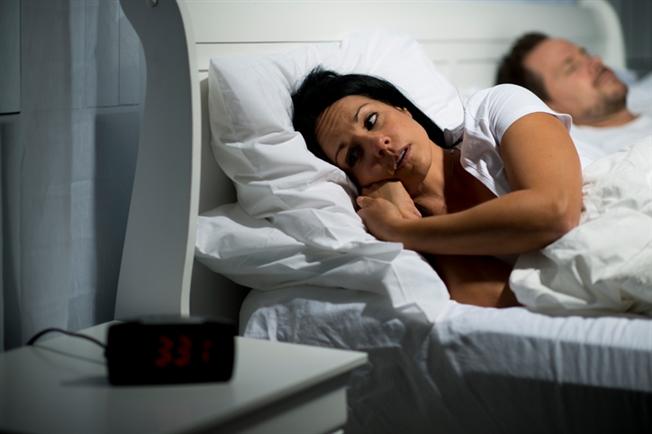How to deal with hormonal changes and sleep problems

There are a number of things that can affect sleep quality, including your health, weight, stress levels and lifestyle. But for women, there's one more factor to add to the list: hormonal changes.
"Women are more likely to suffer from certain sleep disorders or have difficulty sleeping at some point in their lives because of hormonal changes, like fluctuating levels of estrogen and progesterone. Even everyday hormonal changes can impact your sleep. Not only do they affect your ability to sleep, but also your sleep quality," explains Rochelle Goldberg, MD, system chief of sleep medicine services at Main Line Health and medical director sleep for Paoli Hospital Sleep Medicine.
Women in their 50s and 60s are familiar with the effect that menopause has on their sleep quality, but it's not the only time hormones can make sleeping difficult. During and after pregnancy as well as your monthly periods can also detract from your sleep quality.
Hormonal changes and sleep problems in menopause
"Women will see the most hormonal changes happening around the start of menopause, but you may notice your sleep is suffering even sooner," says Dr. Goldberg.
Hot flashes are the most common culprit for waking women up at night. Sleep apnea and snoring may also increase around menopause. This again relates to hormonal changes, and to the potential weight gain, which is another risk factor for sleep apnea.
Even without hot flashes, hormonal instability can result in more disturbed sleep with more frequent waking or less restorative sleep.
What to do:
Set the thermostat for a low temperature in your bedroom or open a window to decrease your risk of hot flashes. Avoiding spicy foods during the day and exercising regularly can also help. Find additional guidance on menopause and sleep.
Hormonal changes and sleep problems in pregnancy
Difficulty sleeping during pregnancy can usually be attributed to a number of other things, in addition to hormonal changes. During pregnancy, there are numerous discomforts including:
- A growing belly that limits your sleeping positions
- The constant need to use the bathroom
- Tender breasts
And the list goes on. While there's bound to be some discomfort, it doesn't have to become the norm.
What to do:
Goldberg recommends drinking something warm before bed, like hot herbal tea, to soothe you and prepare your body for sleep. While exercise during pregnancy is good, try to avoid exercising more than two hours before bed. Like menopause, the extra weight during pregnancy can also cause women to feel overheated, so keeping the temperature low can also help.Hormonal changes and sleep problems throughout your menstrual cycle
Not every woman will suffer from disrupted sleep during her menstrual cycle, but sleep issues are more common than you might realize. Menstrual cramps, bloating, and body temperature can all affect a woman's sleep cycle for a few days every month. While some women report increased sleep difficulties, others may experience excess sleepiness at these times. These symptoms may be more extreme for woman with premenstrual dysphoric disorder.
Goldberg advises creating a lifelong habit of good sleep routines to help modify or reduce some of these challenges.
"Doing the busy work at home should be done soon after dinner, including the cleaning up, planning the next day, laundry and checking emails," she says. "The preparing for bed starts at least one hour prior to getting into bed. It is the time for YOU. Consider things that are relaxing to help define the end of the day, helping to shut down the mind before bed."
Goldberg further recommends avoiding these things before bed:
- Alerting signals—Such as phone notifications and messages.
- Certain written or TV material—No news after dinner.
- All close-up screens—Including computers, laptops, tablets, ebooks, and yes, the phone. The light signals from these objects are too close and support wake responses in the brain. Blue light blockers may help, but in general it's best to avoid these devices.
- Snacking after 8 pm—Which may also undermine good sleep and is a contributor to excess weight.
Healthy alternatives before bedtime?
"Consider pleasant television programs as the light is further away," Goldberg advises. "Also reading a ‘real book" with interesting but not overstimulating content. Also try music, pleasant conversation and puzzles. It's never too late to establish this approach. This is the base to help when other situations (including hormonal challenges) arise."
Fortunately, hormonal fluctuations are often predictable for women, so you can combat them when you know they're coming. When appropriate, birth control can help put your hormones in a steadier state and mind-body therapies like yoga and relaxation and breathing techniques can also be helpful. These are also useful during the life changes listed above.
Many of these sleep problems are temporary and should only affect women for a limited amount of time. If you're having trouble sleeping night after night, talk to your doctor. There could be other contributors to why you're having trouble falling asleep, staying asleep, or feeling rested.
If you have a sleep disorder, you don't have to resign yourself to a life of mental and physical exhaustion. Make sure you're getting the best rest possible with the sleep medicine team at Main Line Health.
To schedule a sleep study at Main Line Health, call 484.227.4167 (Media), 484.337.3300 (Newtown Square), 484.565.1358 (Paoli) or 484.476.3400 (Wynnewood).
 Content you want, delivered to your inbox
Content you want, delivered to your inbox
Want to get the latest health and wellness articles delivered right to your inbox?
Subscribe to the Well Ahead Newsletter.
